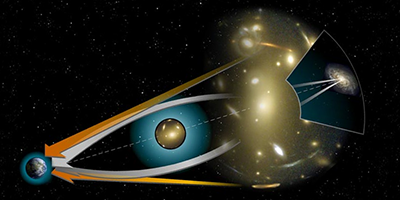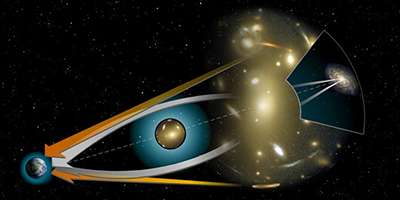Quantum Bending of Light
Light traveling close to an object gets deflected from its path because of the pull of gravity. For a massive object like the Sun, this deflection is measurable: The best measurements to date show that the gravitational pull of the Sun deflects light by º—in line with the predictions of general relativity. Now Niels Bjerrum-Bohr, at the Niels Bohr Institute in Denmark, and colleagues have calculated how this deflection would be altered when gravity is described as a quantum field.
The authors describe gravity using an effective-field theory—a low-energy approximation of a possible underlying quantum-field theory of gravity. This allowed them to compute how photons couple to gravitational effects, formulating an analytical solution to the problem of light deflection by a heavy object like the Sun or a Schwarzschild black hole. While their predicted quantum correction is too small to be measured experimentally (the effect of gravity is 80 orders of magnitude bigger), they show that quantum effects do cause a difference. This difference arises from the fact that massless particles like photons are no longer confined to traveling exactly on geodesics (in general relativity, the straight lines modified by spacetime curvature along which any free-falling particle moves). In particular, they are predicted to bend differently depending on their spin. These departures from the behavior predicted by general relativity amount to a deviation from Einstein’s equivalence principle. The computational framework presented by the authors provides a simple way to evaluate the possible effects of quantum gravity on light bending and other cosmological phenomena.
This research is published in Physical Review Letters
–Katherine Wright





